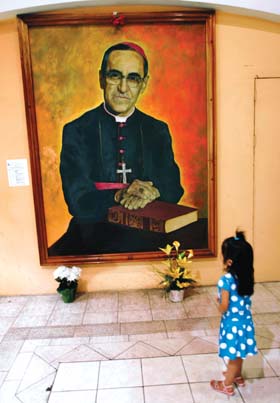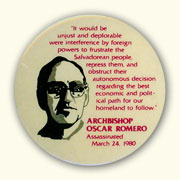
From our undercover correspondent we keep on retainer on assignment in an undisclosed location south of the border, Guy Noir - Private Eye:
Oscar Romero... a fascinating case in the saint making process. Here is Dwight Longenecker weighing in: "My doubts about Oscar Romero" (Crux, February 4, 2015).
I also recall Kenneth Woodward's detailed account of the man in Making Saints. Romero seemed heroic. What would the contemporary churchgoer make of the fact that no one from Rome even attended the guy's funeral, or that St John Paul the Great gave the man a dressing down for his outspokenness only years before his martyrdom? Or how does Bishop Cupich's distaste for public protest of abortion look compared to Romero's attempts to speak truth to power. How much and how strangely the world has changed in 25 plus years! Then there is this perspective that I admit had already crossed my mind as well... Zoe Mintz, "Pope Ends ‘Doctrinal Logjam’ By Calling Salvadoran Archbishop Oscar Romero A Martyr" (International Business Times, February 3, 2015):Romero was not always considered progressive. In fact, he was appointed archbishop because he was considered a safe and conservative choice. Romero changed his stance after he witnessed the suffering of El Salvador’s poor while serving as a bishop of Santiago de María. On March 12, 1977, the Rev. Rutilio Grande, Romero's longtime friend and a Jesuit priest, was assassinated. This propelled Romero into the political spotlight. He suspended masses the following Sunday at area churches and demanded justice. Pope Francis may have gone through a similar intellectual experience. While serving as Jesuit provincial of Argentina, or the order's leader in the country, he did not display an especially strong tendency to advocate for the poor. After he became archbishop of Buenos Aires, witnessing widespread poverty and the limitations traditional methods like charity had to address people’s needs, his public stance changed. “In this sense Bergoglio [Pope Francis] mirrors a similar conversion that Oscar Romero himself underwent,” Bretzke said.But then note this subtle switch:Despite Romero’s association with the controversial ideology, everyday Salvadorians don’t necessarily see him as a face for liberation theology. “Rather, he seemed to be a temperamentally and theologically conservative person who was genuinely moved by the plight of ordinary people under a repressive government,” Bill Portier, a theology professor at the University of Dayton (Ohio) who specializes in U.S. Catholic history, told International Business Times.That hardly suggests an intellectual change. Isn't it a bit more likely, in the case of Romero and Francis both, that there in fact was an intellectual change, only one that remained rather ethereal or easy to miss given the retention of Catholic vocabulary and ritual and the assumptions of the average churchgoer. The same phenomenon is at work within the large group of Evangelicals who have already "sainted" Bonhoeffer without any recognition whatsoever of his advocacy of "religionless Christianity."
But those versed in liberal theology mince no words. Try on these for size: "Thereis much that this former Archbishop of San Salvador shares with Pope Francis. Both are seen as champions of the people, with an especially keen sense of the godlessness of any system that oppresses and subjugates the poor. Both are unlikely leaders in the Roman Catholic Church, given their support for conservative theology and 'order' prior to their elevation as leaders in the Church. Both surprised their supporters in taking a much more critical stance toward the abuses of capitalism than would have been expected of a conservative leader." There is much more here, and look at the source: Gene Robinson, "Pope Francis Knows: Oscar Romero is the People’s Saint" (Reuters, February 8, 2015). Elsewhere, Frank Raga ["The Church flowed from the Second Vatican Council?" (Shield of Faith, February 5, 2015)] is convinced that as a symbol Romero is the third panel in the uneasy but insistent Vatican II Canonization triptych that includes Popes John and John Paul II and cements a legacy for the Church of Vatican II.
You can judge for yourself, since Plough books is offering an anthology for free: Oscar Romero, The Violence of Love (Plough, 2014).



2 comments:
I've never understood the flirtation of Catholic theologians with liberation theology. Even the Prefect of the CDF, who seems otherwise pretty solid, has expressed approval of liberation theology, as I recall. Maybe even Pope Francis.
Did Oscar Romero die for God or did he die for politics?
Post a Comment